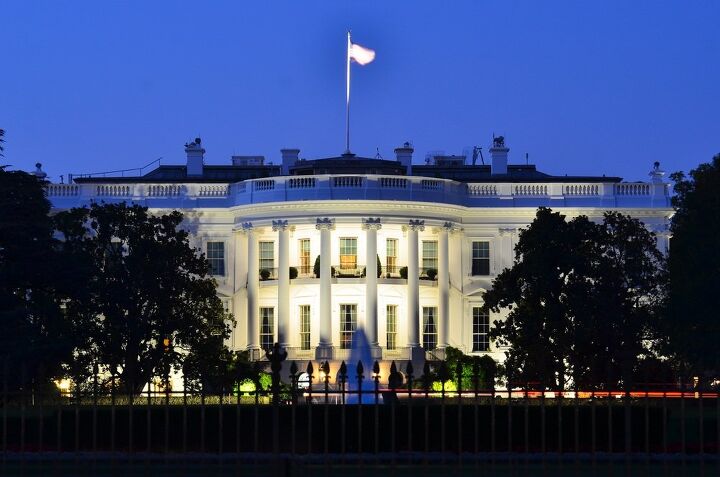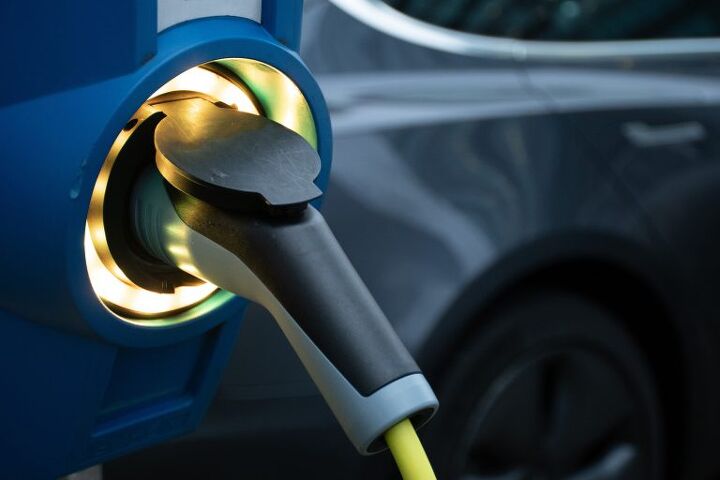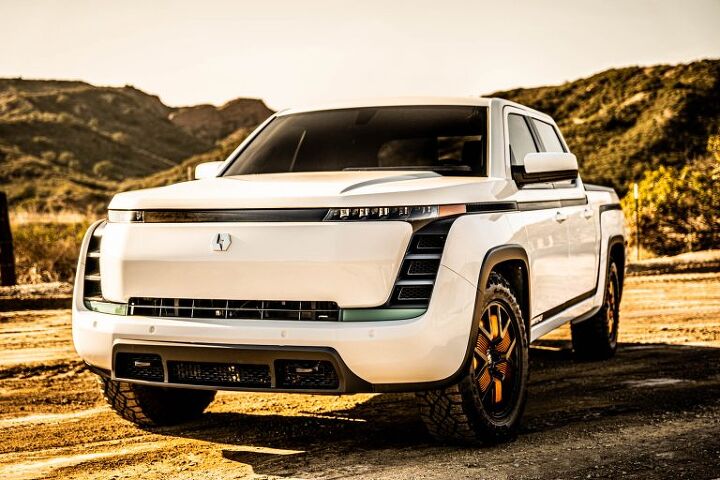#ElectricVehicles
Report: Biden to Use Wartime Powers to Boost EV Battery Production
U.S. President Joe Biden is said to be considering utilizing wartime powers to spur domestic electric vehicle battery production. The administration reportedly wants to add the necessary raw materials to the Defense Production Act (DPA) penned at the start of the Korean War in 1950.
Originally designed to give the federal government more control of the U.S. economy (especially in regard to raw materials) throughout the Cold War, the law has also been leveraged by the Department of Defense to advance new technologies starting in the 1980s. In 2011, Barack Obama invoked the act to force telecommunications companies to provide detailed information to the Commerce Department’s Bureau of Industry and Security. Donald Trump would later invoke the DPA to identify an array of products deemed critical to national security as the trade war with China heated up, and then again to spearhead domestic production of materials and goods pertaining to the COVID-19 pandemic.
Dealers Annoyed With Price of EV Charger Installs
As the industry continues struggling with its planned swap to electric vehicles, we’ve seen plenty of framing suggesting dealer networks are only too happy to participate. But it’s usually juxtaposed with articles indicating that pushback exists, typically whenever the metaphorical rubber meets the road. This month provided several premium examples stemming from the National Automobile Dealers Association Expo (NADA Show 2022) held at the Las Vegas Convention Center.
Though the best had to be when several dealer groups piped up about how much it’s actually going to cost them to install some of the newer chargers some manufacturers believe should be mandatory if they’re intent on selling EVs. Some showrooms are finding out that not all buildings are wired for the high loads incurred by modern charging systems, requiring additional financial investments they hadn’t counted on. With automotive dealerships using product delays as leverage for unprecedented vehicle pricing, it’s nice to see them getting a taste of their own medicine. Or it would be if the costs for updating facilities weren’t guaranteed to be reflected on future window stickers.
Ford Lighting EPA-Estimated Range Confirmed
With window stickers of Ford’s all-electric Lightning pickup having leaked late last week, there were a lot of people interested in having their “Fuel Economy and Environment” estimates verified. Ford CEO Jim Farley has obliged by confirming the figures, adding that the vehicle’s maximum range should ballpark around 300 miles (or better) unless you snub the extended-range models.
The executive confirmed the F-150 Lightning XLT, Lariat, and Pro trims at 320 miles with the bigger battery. Though those running with the standard battery pack only yield 230 miles between charging. Meanwhile, the Lightning Platinum tops out at 300 miles even due to it having gnarly tires and being less aerodynamic than its siblings.
2023 BMW I7 Will Have Massive, Pointless Grille
With the electrified BMW 7-series arriving in earnest next month, the manufacturer has opted to push a few teasers photos to whet our collective apatite for oversized grilles. Despite the i7 being an all-electric vehicle, BMW has kept the oversized-grille motif we’ve already seen deployed on the 4 Series and similarly electric iX SUV.
It might not make a lot of sense from an engineering perspective. But Bavaria feels that the kidney grille is an essential part of the brand’s image, so important that it put a faux variant on the iX. While the i7 teasers appear to lack the painted-on geometric patterns, expect it to be another example of form over function. We just hope BMW actually offers owners the ability to open the hood without the aid of a special tool it doesn’t want you to have.
Opinion: Someone Needs to Teach Joe Manchin How EVs Work
Senator Joe Manchin (D, West Virginia) said something this week that makes me think he needs to sit down with a guide to how electrification in vehicles works.
Tesla Raises Prices Twice This Week
Tesla is receiving a lot of attention for having increased prices twice in one week. The Model 3, often presented as the company’s most-affordable option catering to the masses, now starts at $48,440 in the United States. Its crossover equivalent, the Model Y, now starts at a whopping $64,400 while larger products have surpassed the six-figure point of entry. Despite being the brand’s oldest model, the Model S saw increases over the summer (when it was just $90,000) and has since settled into $101,200 before you’ve even said the words Plaid or Full Self Driving. But the Model X remains even more expensive at $116,200.
Worse yet, those who can afford such vehicles won’t even be able to get them in a timely fashion. Despite weathering COVID restrictions rather well vs legacy automakers, supply chain issues seem to have caught up with the EV manufacturer. Wait times on order vehicles are now several months long. Some customers are being told that they’ll likely have to wait until 2023, specifically those hoping to score a Model X.
Volvo, Starbucks Team Up for EV Charging Pilot Program [UPDATED]
Volvo and Starbucks are teaming up on a pilot program to explore the installation of electric-vehicle charging stations at various Starbucks locations.
Ford Outlines EV Production Strategy for Europe
Ford Motor Co. has shared its intent to launch seven fully electric vehicles in Europe, including a battery-electric variant of the Puma subcompact crossover, its best-selling (and looking) passenger car for the market. Though the first EV in its new product offensive will be a midsize crossover helping Blue Oval deliver on a previous promise to manufacture electric vehicles in Cologne, Germany.
The unit is said to capitalize on Ford’s partnership with Volkswagen Group by leaning on the latter entity’s MEB platform that already underpins VW’s ID products and Audi’s e-tron vehicles. Driving range is estimated at 311 miles per charge, with the company anticipating a formal debut later this year.
Opinion: EV Discourse Once Again Lacks Nuance
Electric vehicles have once again become a political football.
As someone who lived through the Chevrolet Volt discourse all those years ago, I’m getting a sense of déjà vu.
Gas War: EPA Reinstates California's Ability to Set Emission Limits, EV Mandates
The U.S. Environmental Protection Agency has opted to reinstate California’s ability to set tailpipe rules and zero-emission vehicle mandates that are more rigid than federal standards. After quarreling for years over the Trump administration’s decision to roll back Obama-era fueling standards deemed untenable, the Golden State now has the ability to once again make harder for its citizens by forcing them to purchase the kind of vehicles it feels they should be driving — rather than leaving it up to the individual that’s actually buying the car.
Though it might not matter at this point. While California effectively served as a defensive shield against proposed fueling rollbacks while Trump was in office, the Biden administration strategy is broadly in line with its agenda of making gasoline unappetizing to consumers to ensure a speedy transition to electric vehicles. California doesn’t even want people to have access to gas-powered lawn care equipment. The state has effectively served as a test case for Build Back Better since before the phrase passed through the lips of a single politician.
Rivian Rolls Back Price Increase After Making Everyone Angry
On Tuesday, Rivian announced it would be increasing vehicle pricing by roughly 20 percent to account for higher inflationary pressures and higher component costs. It’s not the first electric vehicle startup to do so, or even the first automotive business that realized the hectic economic situation has created a window for expanding profit margins. But it was one of the few to get slapped in the face, metaphorically, after trying to get away with it.
Shares of the company began plummeting almost immediately as it endured widespread criticism, then people started canceling reservations. The plan would have made the $67,500 Rivian R1T electric pickup an $80,000 vehicle, while Rivian would have tacked on an additional $10,000 to the R1S SUV for a new ballpark total of $85,000. This included preorders, which would help to explain why everyone went bananas. But that particular aspect of the plan has been abandoned in an effort to save face and money.
GM Dumps Lordstown Motors
Lordstown Motors has gone from the savior of Ohio to just another blowhard electric vehicle startup. Last year, it became the focus of investment research firm Hindenburg Research and an incredibly damning report that accused the company of fraudulent behavior. The paper cited thousands of non-binding, no-deposit orders and was proven right a few months later when the startup announced it didn’t actually have enough money to commence commercial production. By June, Lordstown was under investigation and losing top-ranking executive with nothing to show for itself other than a factory it purchased from General Motors at a discount where it installed a pointless solar panel array. The company said it would be selling the plant to Foxconn Technology Group (Hon Hai Technology Group) in October, along with $50 million in stock, with the plan being to make the Taiwanese firm a contract assembler for the Lordstown Endurance pickup.
It’s going to need that money too because GM is severing ties with the startup and has confirmed it offloaded its remaining stock over the holidays. While the Detroit-based automaker only held about $7.5 million worth of shares, it still represented about 5 percent of Lordstown and continued support of a business that looked to be foundering.
Russia-Ukraine War Adding to Supply Problems, Auto Industry Reinventing Itself
Volkswagen Group has stalled production in Germany, citing an inability to obtain sufficient parts from Ukraine. The automaker reportedly is lacking sufficient electrical components for its Zwickau-Mosel plant and the Dresden-based “Transparent Factory” — both of which are responsible for manufacturing VW and Audi-branded electric vehicles.
While the automaker declined to identify any specific suppliers, it said that Zwickau-Mosel will be down for at least four days as the Dresden facility will only need three days of downtime. That should put them both back online by the end of the week. But that’s hardly a guarantee and problems abound elsewhere, some of which are starting to feel borderline ordinary, as the industry continues reinventing itself.
U.S. Postal Service Decides to Snub Electric Vehicles
The United States Postal Service (USPS) has been under pressure from the White House to replace its aging fleet with all-electric vehicles. But it’s looking like mail carriers will continue doing their jobs in oddly shaped trucks that burn gasoline.
While the Biden administration’s green agenda calls for government fleets to begin transitioning to EVs, the USPS had already decided to purchase 165,000 examples of the Oshkosh Defense NGDV that’s dependent upon liquid fuel. Despite the contractor saying trucks could be converted into battery electric vehicles and/or hybrids, the vast majority will be wholly reliant on internal combustion. The USPS has decided that it’s just not cost-effective or practical to do anything else and no amount of pressure from the White House will be changing its mind.
Money on the other hand…
Audi Approved for $3.3 Billion EV Factory in China
Audi and FAW Group, the state-owned partner it is effectively required to have in order to preferential treatment from the Communist Party of China, received some good news this week. Government officials have approved the duo for a new, jointly operated production facility in Changchun.
With Volkswagen Group having shifted its focus toward China in recent years, the market has become all-important for the German company. VW is currently the top-selling brand for the entire region, with its Audi subsidiary typically being the highest volume premium automaker from Europe. Building in China is good optics for brands hoping to remain popular there and has the added benefit of placing manufacturing complexes closer to relevant suppliers, especially if you’re swapping to electric vehicles.









![Volvo, Starbucks Team Up for EV Charging Pilot Program [UPDATED]](https://cdn-fastly.thetruthaboutcars.com/media/2022/07/19/9150834/volvo-starbucks-team-up-for-ev-charging-pilot-program-updated.jpg?size=720x845&nocrop=1)



















Recent Comments